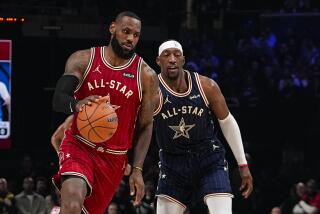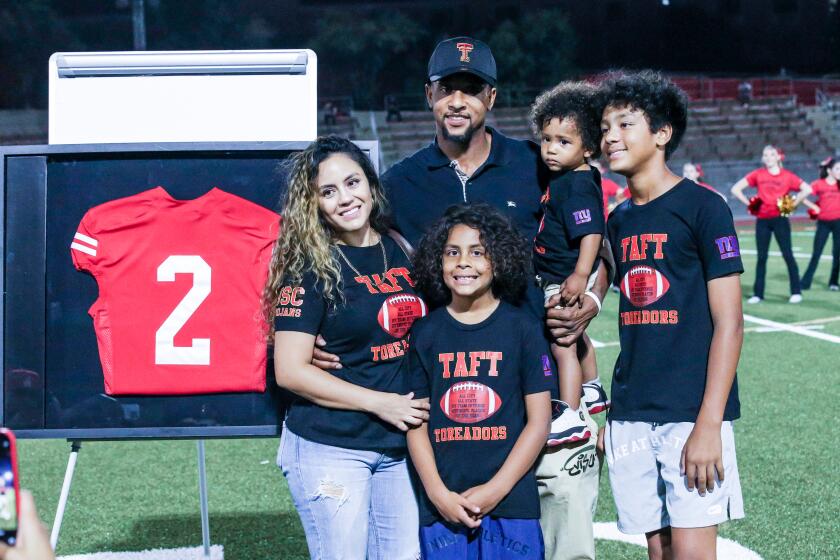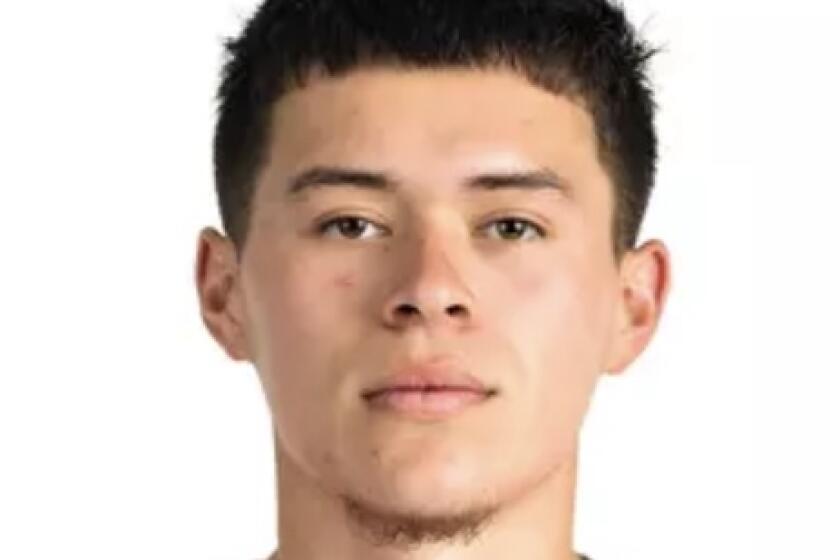Board of Trade : At Only 6-8, Rodman Has Relied on Strength and Desire to Take Art of Rebounding to New Heights
- Share via
CHICAGO — How about this for an all-timer: Dennis guarding Shaq? OK, he got more press for arriving at his book signing on his Harley in drag, heavy makeup and feather boa, but let’s face it, anyone can do that. In Dennis Rodman’s circle--Howard Stern, Madonna, et al.--they all cross-dress when their books come out.
However, there isn’t another shock jock, pop diva or NBA player of 6 feet 8, 220 pounds, who can guard Shaquille O’Neal, who’s four inches taller and at least 100 pounds heavier.
But Rodman did. It was only a part of his genius. Players his size aren’t power forwards, don’t lead the league in rebounding or rebound at levels not seen since Wilt Chamberlain--or ever--but Rodman does.
“He’s 6-8 and he’s stronger than anybody on the court,” says John Salley, a teammate with the Detroit Pistons when they broke in together in 1986 and now with the Bulls. “Most cowboys are not fat. They’re really thin and wiry.
“You know what? Shaq is nothing to Dennis. Let me tell you why.
“Our first year, we went to the All-Star break. I go back to Atlanta. You know, I’m a 22-year-old ladies’ man. He goes to Oklahoma--and castrates 300 cattle.
“I say, ‘What do you mean?’
“He says, ‘I hold ‘em down while they castrate ‘em and throw alcohol on ‘em.’
“I’m looking at him like, yeah, OK, I’m waiting for the punch line. He was serious as hell.
“He says, ‘I’m so tired, man.’
“I say, ‘Yeah, you were hanging out too?’
“ ‘Nah, man, had to castrate those cows.’
“What kind of stuff is that? So with Shaq--doesn’t have horns--that’s no problem.”
*
Not many great rebounders come from rural Oklahoma. Rodman doesn’t either, but he came to think of it as home, after attending Southeastern Oklahoma State.
Rodman’s genius sprang from anguish. His real home was Dallas but it was an unhappy one for him. His father left early. His two sisters were high school basketball stars. He was a runt, only 5-10 when he left school, and never made the team.
He got a job at the airport but was fired for stealing watches from a gift shop. He says his mother threw him out of the house. She says she didn’t. In any case, problems seem to remain. At Christmas, 1994, when he was in San Antonio, his mother and sisters came to see him; he left them in his apartment and spent the day with teammate Jack Haley’s family.
Two years after finishing high school, he sprouted to 6-8 and got his gig at Southeastern Oklahoma. Four years later, he put himself on the map in the pre-draft camps and entered the NBA as an unknown 25-year-old second-round pick.
From the beginning, his energy and finger-pointing exuberance made him loved (in Detroit) or hated (everywhere else). He had magic legs; he pranced when he ran, as if he could barely keep himself on the floor. He had endless, manic, kamikaze energy. The only thing he could do that involved the basketball was retrieve it, but he made himself valuable.
“Who wants to rebound? Nobody. Who wants to score? Everybody. I saw that when I came into the league, plain as day,” Rodman says in his book, “Bad as I Wanna Be.”
”. . . Nobody--ever--has taken rebounding and built an entire career off it.”
Rodman and Salley were the final pieces in the Bad Boys’ title runs of 1989 and 1990. When the veterans got old, Rodman’s minutes went up and he began posting incredible rebound totals.
In 1990-91, the first season in which he played 30 minutes a game, he averaged 12.5 rebounds, second in the league.
In 1991-92, he went up to 40 minutes and 1530 rebounds--18.7 a game--the most in 19 seasons.
Factoring in changes in the game--fewer shots, better shooting, fewer misses--Rodman had just posted the greatest rebounding season ever. In 1960-61, Chamberlain’s NBA record, 27.2 rebounds a game, represented 36% of his team’s total. In 1991-92, Rodman took 42% of his team’s total.
“It’s amazing, absolutely amazing,” said then-76er general manager Gene Shue, whose NBA service extended back to 1954.
“If you compare him to anybody--you can’t compare him to anybody. . . . I don’t know what they have him listed at, but that’s real light for a rebounder. I mean, he’s different.”
The differences weren’t confined to the court. Painfully shy--”29 going on 15,” said an insider--Rodman ducked interviews and, even after playing more than 40 minutes, rode an exercise bike after games. Still despairing of getting enough exercise, he added hand weights.
He married a Sacramento model who threatened him with a paternity suit, but they soon broke up. He says he contemplated suicide. He mourned the departure of Coach Chuck Daly and refused to even acknowledge his successor, Ron Rothstein, finally forcing the Pistons to trade him.
When Rodman showed up in San Antonio in 1993, it was in his present look: dyed hair, tattoos, earrings, etc. A go-round with Madonna and two flaming playoff exits by the Spurs made him truly notorious. The trade to the Bulls kicked it up another level.
Now he has only to write an ending. Imagine the possibilities.
*
How does he do it?
NBA coaches have long noted that most rebounds are taken under the rim, that excellence is not determined by height and jumping ability above but effort and determination below.
Rodman seems to start at a considerable disadvantage since he’s so much smaller than the other big players. His height--he’s listed at 6-8 and claims to be 6-6; Michael Jordan guesses 6-7 1/2--is slightly above average for all NBA players. Rodman’s competition for rebounds--centers and power forwards--average about 6-10, 250, but he makes up for it.
Here’s how:
Desire--Having decided rebounds were important to him, Rodman turned their pursuit into a crusade.
Watch him instead of following the ball. You’ll see him fighting tirelessly for position, grabbing, nudging, entangling and wrestling bigger players out of the way, not just when he has the advantage but on every play.
“What makes Dennis a great rebounder,” says Haley, “is his quickness, his tenacity and his absolute relentless desire to get every . . . single . . . rebound. I mean, he’ll run down a loose ball from half court. The guy is going to get the ball.”
Tenacity--Rodman’s mission does not end when the Bulls, now outrebounding opponents by 10 a game in the playoffs, get the ball. It ends when he gets the ball. Teammates know not to get in his way, lest he go through them too.
“Oh yeah,” says Haley, “we know. You know Dennis doesn’t care which team you’re on, he wants the rebound.”
Rodman said in his book, “I’m hungrier than those other guys out there. Every rebound is a personal challenge. I train my mind to believe. I need to get every rebound just to stay in the league. If I don’t get the ball, I’m going back to Dallas, back to the streets, back to that hell.”
Hands--Though he lacks the confidence to try much on offense, Rodman has great hands. On the Bulls, they’re the stuff of legend, like Paul Bunyan and his blue ox, Babe.
“His hands are so strong,” Haley says, “when he comes out, you watch him, when he high-fives guys coming out of the huddle, he does it backhand because his hands are so strong, he’ll tear your hand off.”
Stamina--How many other players do you think ride exercise bikes after games? Right, none.
Second jump--At 35, Rodman still has great legs. Often the smallest player in the pack, he has adopted a technique of tipping the ball into the air, since he has found few players can jump again as fast as he does. He often tips it two or three times or more until it’s safe to claim his prize.
“The one thing I do that nobody else does is jump three and four times for one rebound,” he said. “I stay with the ball and control it by tipping it closer and closer to myself, until I get it close enough to get both hands on. I’ve got a quick jump--one of the quickest. I can get down on the floor and back up in the air faster than a pogo stick.”
And it isn’t merely rebounding.
Rodman has been an all-defensive first-teamer in eight of the last nine seasons. He’s a two-time defensive player of the year. Daly put him on anyone, from guards like Jordan and Magic Johnson, to centers like Patrick Ewing. In his book, Rodman claims he was responsible for Scottie Pippen’s migraine headaches in the old Piston-Bull battles, and there might be something to it.
Some coaches say Rodman won’t leave the basket to guard anyone since it takes him away from his beloved rebounds. True or not, when he wants to defend, he still can. In the Knick series, he cut five points off Anthony Mason’s regular-season average. In the only game he faced Orlando’s Horace Grant, he outrebounded him, 21-1, and outscored him, 13-0.
As the playoffs go on, the Bulls are falling in love with Rodman all over. They were reportedly set to offer him a one-year deal and let him go if he turned it down, but now Coach Phil Jackson says he’ll recommend two years.
But if something goes wrong, Rodman can probably find a team willing to put up with dyed hair, tattoos, not talking to teammates, etc. for those 14 rebounds a game.
In the end, Rodman’s genius isn’t only for self-promotion. It’s not even primarily for self-promotion.
Imagine what he’d be, without the tattoos, earrings, etc.
“A Dream Teamer,” says Haley.
That isn’t hype. That’s for sure.
(BEGIN TEXT OF INFOBOX / INFOGRAPHIC)
On the Rebound
A look at how Dennis Rodman compares to the all-time leading rebounders at the same point in their careers (10 years):
*--*
Player Ht G R Avg Rodman 6-8 741 9,441 12.8 Chamberlain 7-1 787 19,112 24.3 Russell 6-10 727 16,985 23.4 Malone 6-10 741 10,726 14.5 Abdul-Jabbar 7-2 773 11,460 14.8 Gilmore 7-2 796 11,613 14.6 Hayes 6-9 815 11,977 14.7 Parish 7-1 787 7,859 9.9 Thurmond 6-11 695 11,893 17.1 Bellamy 6-11 809 11,483 14.2 Unseld 6-7 762 11,172 14.7
*--*
More to Read
Go beyond the scoreboard
Get the latest on L.A.'s teams in the daily Sports Report newsletter.
You may occasionally receive promotional content from the Los Angeles Times.










